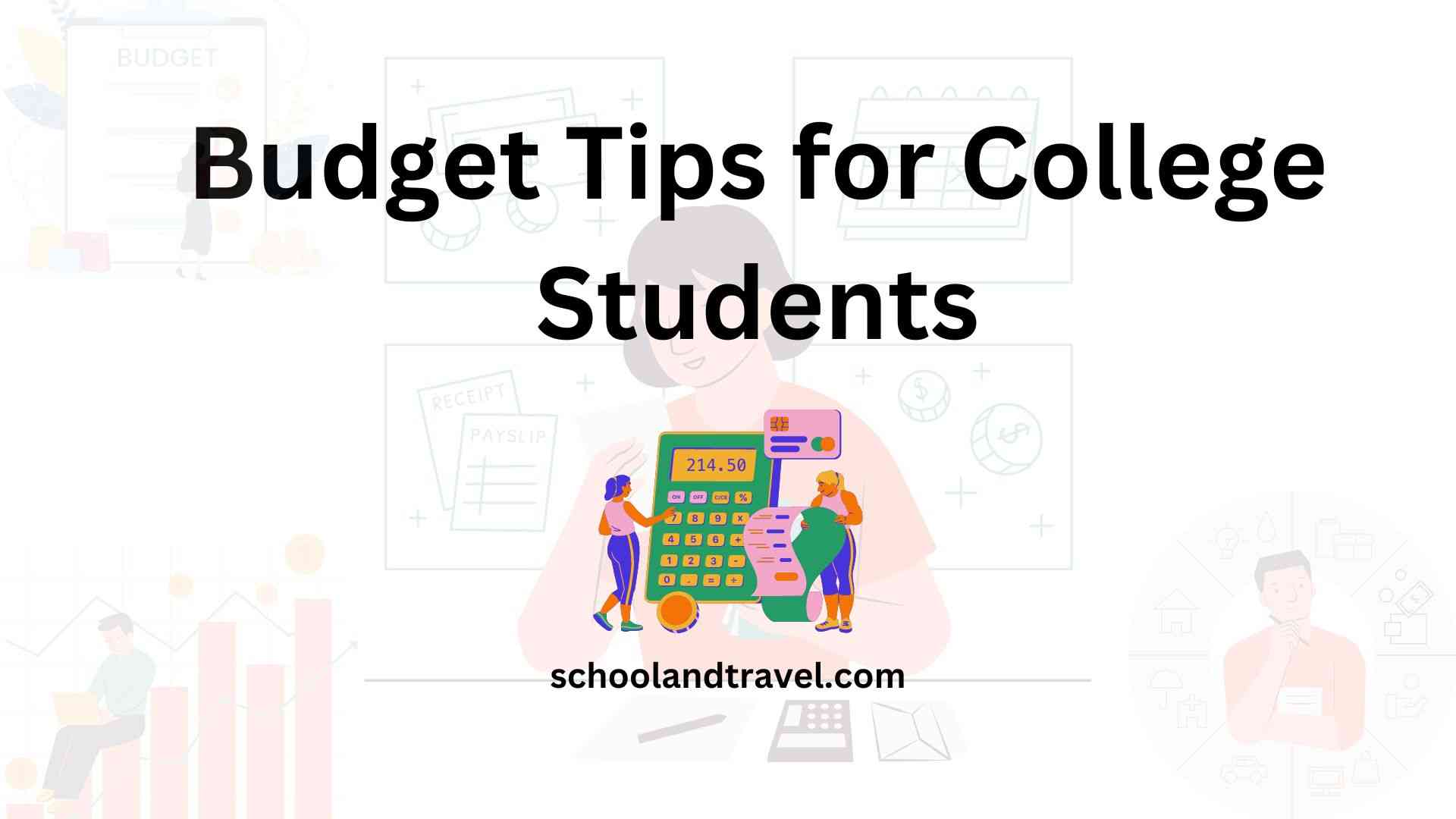As a college student, you must live off a considerable budget to avoid running out of money.
Creating a budget plan, on the other hand, is not easy for anyone to do. However, developing the ability to plan a budget right from college is a skill that will serve you well for the rest of your life.
This post will provide several tips that will enable you to become more financially stable as a college student and avoid the trap of wastage and borrowing that can be disastrous for your future.
What is Budgeting?
A budget is a set of preset financial calculations for a period, most commonly a year or a month. Making a spending plan or budget is an important financial habit.
A budget describes this set of financial guidelines. By making a budget, you can see in advance if you have enough money to cover your expenses and yet have some left over for extras.
Putting together a budget is as easy as matching your income with your outgoings.
What is Budgeting For Students?
Budgeting is an ongoing process that students engage in to plan for and achieve their short, medium, and long-term financial goals.
By maintaining a budget, students may ensure that they have the resources necessary to cover essentials like housing, food, utilities, education, and transportation.
A student budget is a roadmap to help you achieve your financial objectives. When you have a budget, you won’t be left wondering where your money went, and your finances will remain under your control.
15 Budget Tips for college students
1. Use an App
There are several budget planning apps in the world at the moment. A budget app can help you to structure your bills and guide you from spending money carelessly.
It does not even cost anything to use most of them. As a college student, try and find an excellent budget planning app for yourself and use it consistently.
2. Begin to pay off student loans
Don’t wait till you start working before you begin to pay back the student loans you collected for your education.
This is because waiting many years will only increase the interest rate, drive the total loan amount higher and make it even more challenging to pay off.
Pay the interest first if your student loan is too big to pay off while in school. Developing the culture of consistently repaying your student loan will assist you in completing the payment much quicker.
3. Take advantage of coupons
It is incomprehensible for students to be ashamed of using coupons to purchase things. Although most people look down on coupons, no one cares when you use a coupon as a student.
Almost every company offers product coupons, and you will find out if you conduct intensive research. The extra money you save as a student can go a long way in settling a need.
4. Attend free events
Most academic institutions regularly organize free events for their students. So, it would be best to attend those events over those with gate fees.
For instance, if you love to see movies, rather than spending money to go to a local cinema, waiting right until your school organizes a film night will help you save money, especially if you are not going alone.
Additionally, campus events are an excellent opportunity to connect with new people.
5. Save!
The importance of having a bit of savings as a student cannot be overestimated. This is one of the most important budget tips for college students.
If you have some savings, you can tackle any financial challenge on rainy days or unforeseen expenditures.
Even if you don’t have huge finances as a student, start by saving 10% of the total cash that enters your hands. You can increase the percentage of your saving as your finances get better.
6. Don’t always have cash at hand
Having too much cash on you every time will motivate you to spend money carelessly. To avoid this, minimize how much cash you have and put all your money in the bank.
Only withdraw enough cash if you go out for a social event or have fun.
7. Leverage your student ID or student email
Most companies offer discounts to students. However, you can only leverage this discount when purchasing their goods or services if you have your student ID card.
If you are shopping online, use a valid student email to place your orders and always have a scanned copy of your student ID on your device, which may be required to access most online discounts.
Purchasing goods and services at discounted rates will also help you to cut costs.
8. Double or triple your credit card payments
One of the worst things that can happen to any student is having both a high credit card debt and a student loan at the same time.
If you have accumulated an enormous credit card debt, one of the best acts you can do is to pay off the high-interest debt first.
However, this is difficult, and you may have to double or triple your payments simultaneously.
9. Don’t overspend at a shop
Wasting food as a college student living off a tight budget is a budget crime. To avoid living a wasteful life, purchase just the stuff you need from the store and avoid reckless spending.
Always have a weekly grocery budget and don’t exceed it no matter what. Developing the discipline to abide by this budget rule will help you throughout college.
10. Enrol in a community college
Enrolling in a program at a community college first before transitioning to a four-year college is another money-saving hack highly recommended for college students.
Since you can complete a transfer to a university with an associate degree, attending a community college first would be best to avoid spending money on the massive cost of freshmen education that is obtainable at any university.
11. Reduce borrowing to the minimum
If you must leverage student loans to cover your academic costs, reduce them to the minimum. Whether you declare bankruptcy or not, repaying a student loan debt is the only way to resolve it.
So, make sure you develop the right plan that will assist you in tackling any student loan. This is one of the most important budget tips for college students.
12. Obtain a cash-back credit card
Obtaining a cash-back credit card is an excellent financial step if you are accountable with credit cards. A cash-back credit card will enable you to make money even as you buy goods daily.
However, the benefits of using this card type differ from one financial establishment to the other. So, choose the one whose incentives best align with your financial plan.
13. Maintain an excellent academic result
One of the best ways to make money as a student is through scholarships. However, most of the best-paying scholarships are offered to students with excellent academic standing.
Besides scholarships, some companies offer mind-blowing discounts to students with good grades.
You can earn excellent grades in school if you attend classes consistently, study intensively every day, complete your assignments and hand them in before the deadline and use practice tests to prepare for exams and tests.
14. Purchase goods at the dollar store
Honestly, no one prefers to buy stuff at the dollar store. However, it does not change the fact that they offer goods at cheap rates.
To save a few bucks, buy stuff you will discard at your local dollar stores, such as trash bags, paper towels, and others.
15. Cook your meals
Cooking your meals as a student is another fantastic money-saving hack. Besides the fact that you will only have to pay for what you want to consume in your food, home-cooked meals are healthier.
Frequently Asked Questions (FAQs) on Budget Tips for College Students
You can create a budget as a college student by evaluating your net income, trailing your expenditure, having achievable targets, creating a plan, modifying your expenditure to remain on a budget, and reassessing your budget consistently.
You can manage money effectively by creating a personal budget, saving for retirement, trailing your expenditure, saving for unforeseen issues, establishing a debt payment plan, and cultivating impressive credit card practices.
You must define the following elements to create a reasonable budget; income, fixed, variable, and unplanned expenses.
A budget helps you to trail when and how you make and spend money. It is necessary for personal success.
Conclusion
Creating a spending plan is a difficult task for anyone. Nevertheless, as a student, you must stick to a reasonable budget so that you don’t end up in a financial bind.
Knowing how to budget is a lifelong asset, and it’s one you can start cultivating in college.
In addition to the tips above, working, avoiding cable, and abstaining from smoking are other budget tips you should practice as a college student.
Awesome one; I hope this article answers your question.
Editor’s Recommendations:
- Top 5 Free Mood Board Software Options for Creatives on a Budget
- 4 Hacks You Need Before Traveling Across Europe on a Student Budget
- 100% Creative ways to save money on a tight budget
- Solo Travel for College Students: Embracing Independence and Self-Discovery
- 7 Financial Facts of Life That Needs To Be Taught In Schools
If you find this article good, please share it with a friend.




